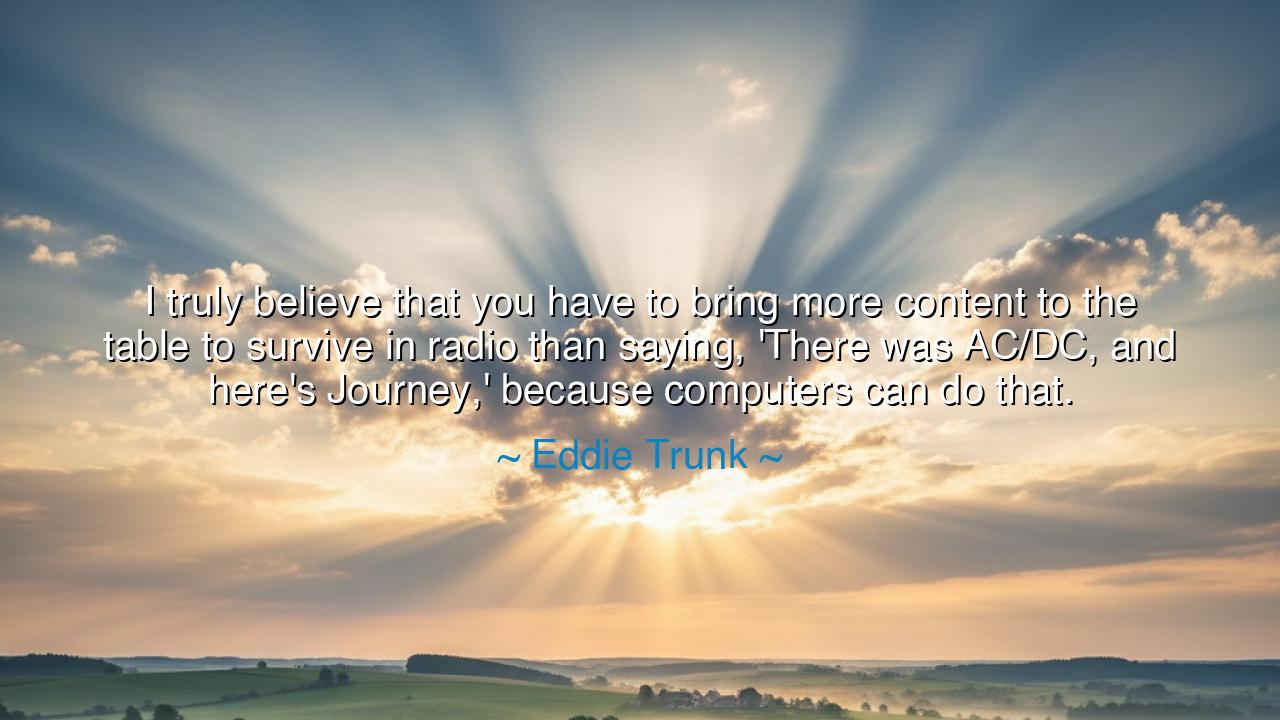
I truly believe that you have to bring more content to the table
I truly believe that you have to bring more content to the table to survive in radio than saying, 'There was AC/DC, and here's Journey,' because computers can do that.






The musician and storyteller Eddie Trunk once said: “I truly believe that you have to bring more content to the table to survive in radio than saying, ‘There was AC/DC, and here’s Journey,’ because computers can do that.” Though these words arise from the world of music and airwaves, they resound far beyond the studio walls. In them lies an ancient lesson dressed in modern sound: that the human spirit—with its warmth, wit, and insight—must forever rise above the cold perfection of the machine. Trunk speaks of authenticity, of the irreplaceable depth that only a living soul can bring to art, to work, and to life itself.
In the days before the digital age, the voice of a radio host was not merely a tool—it was a companion, a storyteller, a spark that carried emotion through the invisible air. To speak between songs was not a task of function, but an act of communion. What Trunk laments, and warns against, is the creeping danger of automation—the hollow convenience that replaces the heart with algorithms. When he says, “computers can do that,” he reminds us that machines can repeat, but they cannot feel. They can simulate rhythm, but not soul. They can announce a song, but not awaken a memory.
The lesson is ancient, and echoes through the ages. When the scribe’s quill gave way to the printing press, many feared that books would lose their sanctity. But the wise learned that what endures is not the tool, but the touch of the creator’s mind. In every era, new instruments arise—mechanical, digital, or otherwise—but only the human presence gives them meaning. A host who speaks from the heart transforms radio from noise into connection, just as a poet transforms ink into prayer.
Consider the tale of Orson Welles, whose 1938 broadcast of War of the Worlds stirred an entire nation into believing that the earth was under attack. Why? Because his voice carried conviction, fear, and imagination—qualities that no machine could replicate. It was not the sound, but the spirit behind it that shook the world awake. And so Trunk’s warning becomes timeless: when the airwaves, the workplace, or the world itself become ruled by automation, those who endure will be those who bring content, meaning, and presence beyond what machines can mimic.
Trunk’s words also speak to the dignity of craft. To “bring more to the table” is to labor with love—to learn the stories behind the songs, to share the laughter, the loss, the humanity that binds artist to listener. It is a call to depth over convenience, to effort over automation. The human voice, like fire, needs tending; it cannot be left to burn itself. Each word we speak, each act we create, must carry the warmth of our individuality, or else it fades into static.
And so the wise will not compete with machines on their terms—they will transcend them. Let the computer handle precision, but let the heart handle passion. Let technology serve as the instrument, not the orchestra. For when the digital world hums cold and perfect, it is the imperfect human touch that restores beauty to its song.
The lesson, then, is clear: do not merely perform—contribute. In your work, in your speech, in your art, bring the soul that cannot be programmed. Learn deeply, speak sincerely, and never forget that creation is not repetition, but revelation. The world may move faster, but meaning moves deeper.
So remember Trunk’s counsel, children of the wired age: the machine may speak, but it does not connect. It may play, but it cannot feel. The true art lies not in pressing buttons, but in touching hearts. Be the one who brings more to the table—more thought, more truth, more humanity—and your voice will never be replaced, for it will belong to the eternal conversation between soul and sound.






AAdministratorAdministrator
Welcome, honored guests. Please leave a comment, we will respond soon